Lumbar facet arthropathy
Lumbar facet arthropathy causes lower back and leg pain on extension.
This page was last updated by Dr Barrie Lewis on 28th September, 2020.
A young person's back displays a healthy lordosis; that is the curve in the lower spine, seen from the side. It is quite normal. When you have lumbar facet arthropathy, you would not be able to lie like that on your stomach with your spine in extension. It would give you lumbago and perhaps also pain radiating down the leg; the part of the lower limb affected depends on which nerve was pinched.
The sciatic nerve comes from the lower lumbar spine and travels down the back of the thigh, outer calf and the foot.
The femoral nerve from the mid to upper lumbars passes to the front of the thigh and inner lower leg.
What is a lordosis?
Viewed from the side, the spine has three normal primary curves. Two of them, in the neck and lower back, are called a lordosis. It is concave posteriorally. Absence of this curve is always potentially serious.
Lumbar facet arthropathy
Lumbar facet arthropathy may also cause pain running down the leg when you bend backwards or to the side.
- Back of the leg? Leg pain sciatica ...
- Groin and front of the leg? Femoral nerve casefile ...
What is a lumbar facet?
Between the bones of the lumbar spine (the vertebrae) there are three joints:
- A disc joint that is a sort of shock absorber.
- Two facet joints.
On either side, between the disc joint and the facet joint lies the foramen where the nerve exits from the spine. That's where the drama begins.
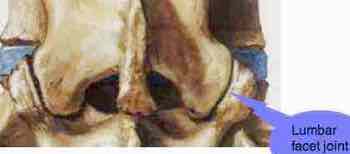
Help for sciatica
Help for sciatica pain is what chiropractors like Bernard Preston do for much of their day; followed by daily lower back exercises you can certainly hope your name won't come up in the dispatches of a lumbar facet arthropathy; it is not a vain hope, and never too late to start.
These are the facet joints, fairly healthy ones. They control how far you can bend and twist your spine. In particular they determine how far you can extend your spine. Those girls have healthy facets! Extension - backward bending - doesn't cause pain obviously. But if and when they pinch the nerve there is help for sciatica pain.
Here you can see the relation between the facet on one side, the foramen with its nerve, and the disc.
Usually before lumbar facet arthropathy begins there are repeated small or large slipped discs that allow the upper vertebra to settle lower on his pal beneath.
This slipped disc diary will give you an idea of what it is like.
What is arthropathy?
We quacks like to use big words to impress you. Like "lumbago". It sounds impressive, but it is just "sore back" in Latin, nothing more.
Try breaking big medical words down into their constituent parts:
Arthr-opathy
- Arthr simply means to do with a joint and is the root of the word arthritis. Arthr-itis. An itis (inflammation) of an arthr (joint)
- opathy simply means "a condition of". Sometimes if we want to sound really impressive and scare you we would say "a disease of". Don't be frightened of that word "dis-ease". It simply means a "lack of ease."
Mostly, it is an osis not an itis. It is essentially non inflammatory, so taking NSAIDs certainly won't help much, except in the short term as a painkiller.
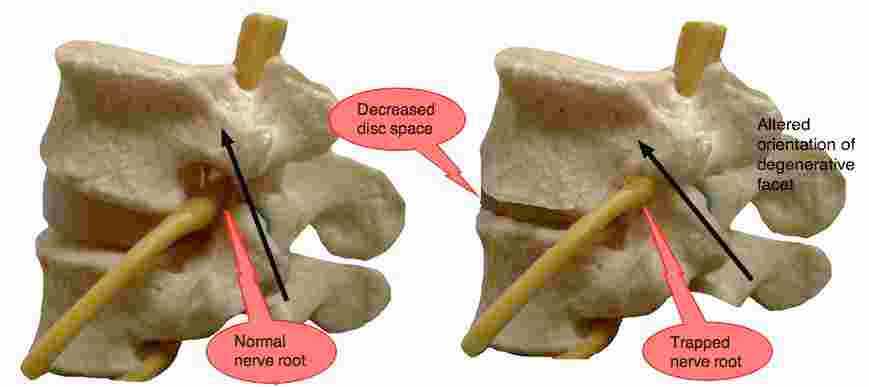
So, arthropathy simply means a condition to do with a joint. In this instance, a lumbar facet causing lower back pain and possibly leg pain.
So lumbar facet arthropathy is simply a condition of the small joints in the lower back; some would call it a disease.
On
the other hand lumbar facet arthritis may be
inflammatory, but even then we chiropractors are not in favour of Non
Steroidal Anti Inflammatory Drugs except perhaps for a very short
period for severe pain as they have such nasty side effects.
Sometimes an arthropathy may become highly inflammatory. Like, gout, which is America's fastest
growing disease. Hospitalisations
have increased by 400 percent in the last 20 years. Whilst this remains
unproven it is most likely since the change from butter to margarine and seed oils rich in omega-6 in the mid seventies; or a highly refined starch diet.
Certainly consider the ratio of omega 6 to 3 in your diet.
There are other less common inflammatory arthritides caused for example by bowel disease; avoid all wheat products if you have colitis. Joint infections, diabetes and a particularly nasty one where the nerve to a joint becomes inflamed can all affect the mechanical parts of the body.
But most lumbar facet arthropathy is non inflammatory. In one sense it's a normal part of aging; like grey hair.
As the facets joints get older, wear and tear sets in, and they get thicker. Extension of the spine gradually becomes more limited.
At foods to reduce inflammation you will find an astonishing admission from a famous heart surgeon.
Immobilisation arthritis
Immobilisation arthritis
is the fate of fixated joints; in the lower back that means lumbar
facet arthropathy; and that is not just the opinion of Bernard Preston.
It's been established very firmly by physiologists.
New research proves though that arthropathy progresses much faster in fixated joints. The cartilage in the joint is starved of nutrition and oxygen: arthropathy.
Medicine tends to see this is an inflammation and treats it accordingly with anti inflammatory drugs
like NSAIDs and cortisone shots. Whilst there is a place for them
obviously, we look rather to the cause and attempt to put the joint back
into motion, and give exercises to keep it moving.

Notice how he bends forwards to relieve the pressure of lumbar facet arthropathy.
Lower back and leg pain
Lower back and leg pain is what takes up much of the time of
chiropractors like Bernard Preston; lumbar facet arthropathy is the
diagnosis that is used so often. Like the needless blindness of macular
degeneration that comes from a deficiency of two important
phytochemicals, the lower back facets can be kept healthy and smooth
with daily exercise and a healthy diet.
Hence chiropractic help. This elderly man has lumbar facet arthropathy; he can't stand up straight because it causes pain in his lower back, and perhaps down his leg.
Lower back and leg pain is the hallmark of this condition.
He's probably been told that he has arthritis, which he does, and that there's nothing that can be done, and he must live with the pain. That's quite false.
Don't you believe it; this is what those pretty young things will look like in fifty odd years if they don't keep those lumbar facets healthy.
Get those joints moving before they turn prematurely to concrete like these in the next CT scan. Notice how the facets have grown out of all proportion and are invading both the spinal canal and the foramen where the nerve exits.
This is lumbar stenosis and it eventually causes pain running down the leg when you stand up straight, extend your spine, and bend to the side.
The result? You walk in a slumped, flexed position, it's the only posture that relieves the pain in the back and leg.
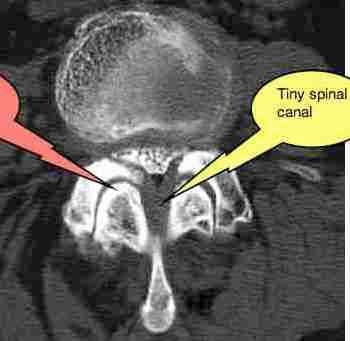
Lumbar Facet Arthropathy - the Cobra
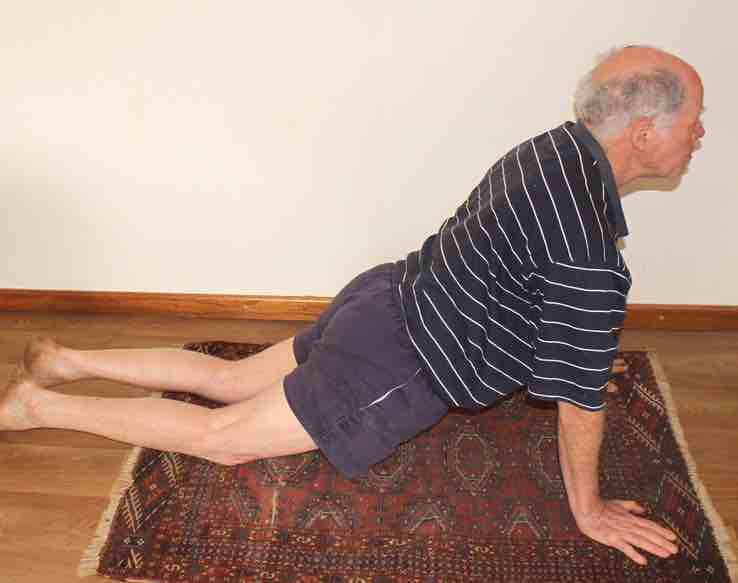
Done in a controlled and gentle manner like this, taking the lower back into full extension, it is a particularly
good exercise for lumbar facet arthropathy. But bending vigorously backwards as I
did yesterday with a heavy chainsaw above my head, one needs to take
great care; a sickening feeling in the lower back gave warning not to
continue and see my own chiropractor the next morning if all was not
well.
Start the cobra cautiously. I have been treating an elderly lady who's nasty sciatica began after it; she too has lumbar facet arthropathy. Do not go too deep for the first few weeks.
Chiropractic
Chiropractic is about the management of fixated joints; it's what
Bernard Preston has spent 35 years of his life doing; that's what
prevents lumbar facet arthropathy in large measure.
The Cobra is an excellent Yoga exercise to maintain healthy joints and help prevent arthropathy. But... you won't be
able to do it easily if you have a lumbar facet syndrome; pain in the low back with extension and side-bending.
Tsk! To think I wrote this whole page just so I could show you those
pretty young women. And my cousin will be telling me, to confess to the whole
world what a dirty old man I am! In his darker moments...
yes, maybe.
LUMBOSACRAL TRANSITIONAL SEGMENT
The last lumbar segment is fairly frequently associated with various anomalies that can contribute to lower back pain. Pseudojoints sometimes form and lumbar spine stenosis can occur. It may also be the cause of scoliosis.
Spondylolysthesis
Spondylolysthesis is sometimes the consequence of lumbar facet arthropathy.
If you were very observant, you may have noticed in the third graphic
- the one just above "What is Arthropathy?" - that the angle of the
degenerative facets on the right flattens. This can allow the vertebra
above to slide forwards, potentially pinching the nerve. It's called an
anterolysthesis, or sometimesa spondylolysthesis.
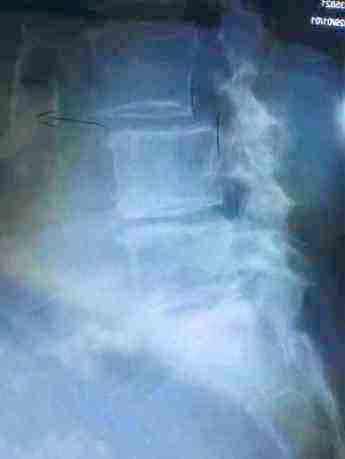
This patient had pain in the front of her thigh, in the distribution of the femoral nerve.
And
another front of thigh severe pain with weakness in the thigh muscles
and numbness on the inner lower leg is what I myself
suffered after a lifting a very heavy patient causing femoral nerve damage.
The Femoral nerve emanates from the mid to upper lower back, as compared to the sciatic nerve which comes from the bottom of the lower back.
Despite a spondylolysthesis, the memorable book Open Andre Agassi tells how he reached the pinnacle of tennis but often with unrelenting lower back pain.
Healthy choice foods
Healthy choice foods have an important role to play in the prevention of lumbar facet arthropathy.
Much of today's supermarket food has been denuded of its vitamins and minerals, and the phytochemicals that reduce inflammation and prevent cancer.
Bernard Preston is firmly of the opinion that if you're eating crap food you can expect to have a lot of pain and be taking a bucket load of pills in the future. A life without medication is not a pipedream; my wife and I are not high on opium; we take virtually no medication whatsoever.
There's no better place than to start making this quick hummus recipe and enjoying it with a green salad most days. Use olive oil and lemon juice; only the extra virgin has the capsaicin. Avoid the inflammatory omega 6 oils that you'll find in many health food stores; we get plenty of them; in fact, too much.
- What are phytochemical foods?
Enjoying vegetables like winter squash which have more omega 3 than 6, making them part of an overall anti inflammatory diet, can only help. This butternut squash soup recipe is my favourite.
Coloured foods contain many of the phytonutrients that unbeknown to us help prevent a host of diseases. Your green salad with extra virgin oil is not only easing your lumbar facet arthropathy but also providing the lutein that is absolutely vital for the prevention of cataracts and adult onset blindness. Read more at zeaxanthin macular degeneration.
Have A Question about your lower back?
I receive many questions about Chiropractic. It might be help with a spinal condition, but it might also be from a person who can't walk after a hip operation, or some such thing.
I will do that by answering your questions personally, but it will be converted to a Web Page so others can benefit from your questions. Omit your name if you like.
However, do understand that, in the main, I'm going to be directing you, should it be pertinent, to a Chiropractor in your neck of the woods. I'll respond to all reasonable inquiries, but please be specific, and give as much detail as you can.
Do understand that lower back pain is extremely complex, so I can only give general guidelines. There's no substitute for a careful thorough chiropractic examination.
Did you find this page useful? Then perhaps forward it to a suffering friend. Better still, Tweet or Face Book it.
